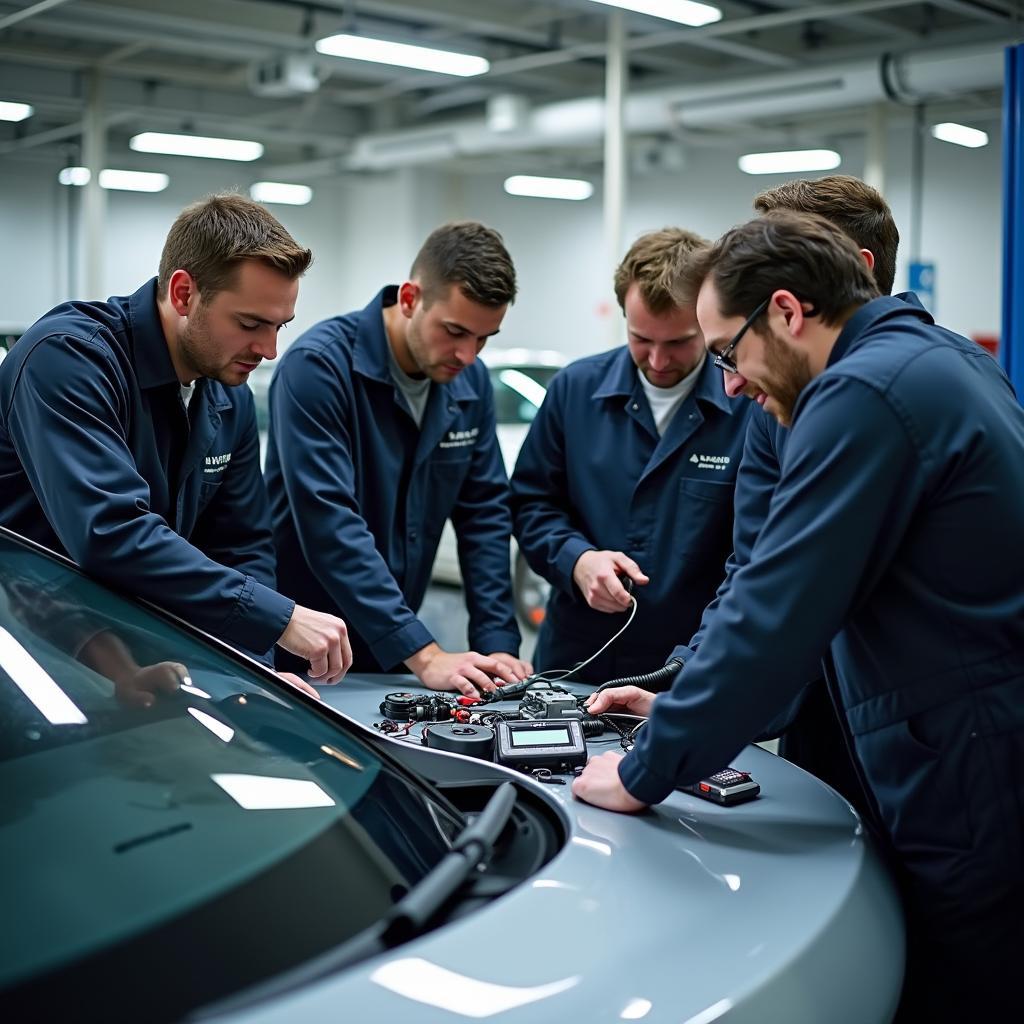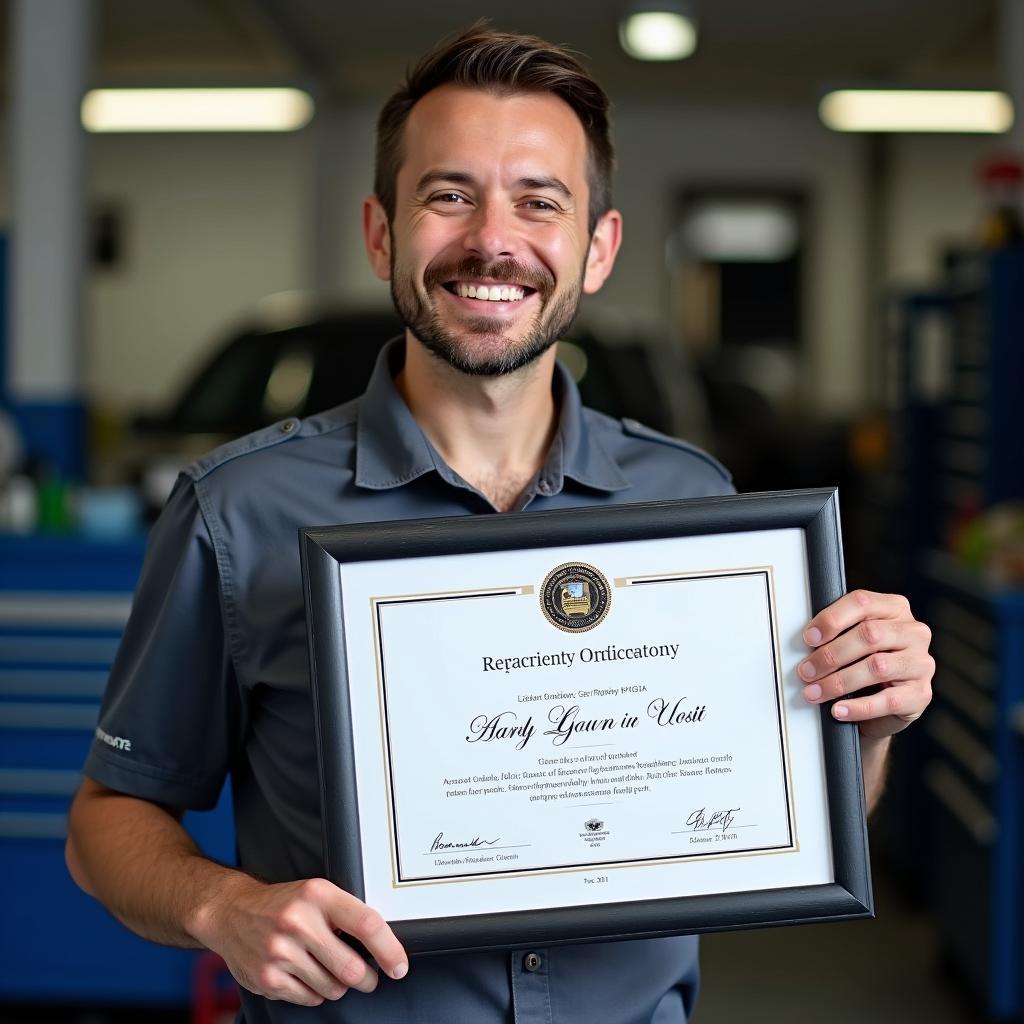The automotive industry is constantly evolving, with new technologies and complexities emerging regularly. To stay ahead of the curve, aspiring and experienced mechanics alike are turning to automobile service workshop courses to gain specialized knowledge and practical skills. These courses provide valuable hands-on training and insights into the latest advancements in car repair, making them essential for anyone serious about a career in automotive service.
Why Choose Automobile Service Workshop Courses?
Choosing the right training path is crucial for aspiring automotive technicians. While traditional apprenticeships offer valuable on-the-job experience, automobile service workshop courses provide a structured and comprehensive approach to learning.
Here’s why these courses are gaining popularity:
- Targeted Skill Development: Unlike general automotive programs, workshop courses focus on specific areas like engine diagnostics, electrical systems, or transmission repair. This targeted approach allows participants to develop expertise in their chosen field.
- Hands-On Experience: Theory is essential, but nothing beats practical application. Workshop courses prioritize hands-on learning, allowing participants to work on real vehicles and practice using industry-standard tools and equipment.
- Exposure to the Latest Technology: The automotive industry is driven by technological advancements. Workshop courses keep pace with these changes, incorporating training on the latest diagnostic tools, software, and repair techniques.
- Industry-Recognized Certifications: Many workshop courses lead to industry-recognized certifications, demonstrating a technician’s competence and credibility to potential employers and customers.
Types of Automobile Service Workshop Courses
The variety of courses available caters to diverse interests and career goals within the automotive service sector.
Some popular automobile service workshop course specializations include:
- Automotive Electrical Systems: This course delves into the intricate world of automotive electrical components, wiring, and diagnostics. Participants gain an understanding of electrical theory and learn how to troubleshoot and repair common electrical issues.
- Engine Performance and Diagnostics: Focusing on the heart of the vehicle, this course covers engine operation, fuel systems, ignition systems, and emissions control. Participants learn how to diagnose and repair engine performance problems using advanced diagnostic equipment.
- Transmission and Drivetrain Repair: This course provides in-depth knowledge of automatic and manual transmissions, differentials, and axles. Participants learn how to disassemble, inspect, repair, and reassemble these critical drivetrain components.
- Advanced Driver-Assistance Systems (ADAS): As vehicles become increasingly sophisticated, ADAS technologies are becoming more commonplace. This course covers the principles of ADAS, including lane departure warning, adaptive cruise control, and automatic emergency braking systems. Participants learn how to calibrate, diagnose, and repair these complex systems.
 Technicians receiving training on advanced driver-assistance systems
Technicians receiving training on advanced driver-assistance systems
Choosing the Right Course
With numerous options available, selecting the right automobile service workshop course is crucial. Here are some factors to consider:
- Career Goals: Determine your area of interest and long-term career aspirations. Are you passionate about engine performance, or does the challenge of diagnosing electrical systems excite you?
- Course Content: Carefully review the course syllabus and learning outcomes to ensure they align with your goals and desired skill set.
- Instructor Expertise: Research the instructors’ qualifications and industry experience. Look for courses led by seasoned professionals with a passion for teaching.
- Reputation and Accreditation: Choose courses offered by reputable training providers or institutions. Accreditation ensures the program meets industry standards.
- Facilities and Equipment: Visit the training facility if possible to assess the quality of their workshops, tools, and equipment. Hands-on learning requires access to industry-standard resources.
The Benefits of Continued Education in Automotive Service
The pursuit of knowledge shouldn’t stop after completing an initial training program. The automotive industry is constantly evolving, making continuous learning essential for automotive technicians.
Here’s why staying updated is crucial:
- Job Security: Technicians who invest in their professional development are highly sought after by employers. They possess the knowledge and skills to handle complex repairs and adapt to new technologies.
- Increased Earning Potential: Specialized skills and certifications often translate into higher earning potential. Technicians who stay ahead of the curve are well-positioned to command top salaries.
- Career Advancement: Continuous education opens doors to career advancement opportunities. Senior technician roles, management positions, and even starting your own repair shop become attainable goals.
 A certified automotive technician proudly displays their achievement.
A certified automotive technician proudly displays their achievement.
Conclusion: Investing in Your Future
In the competitive automotive service industry, knowledge is power. Automobile service workshop courses offer a focused and practical approach to gaining the skills and certifications needed to excel. Whether you’re just starting or looking to advance your career, investing in your education is an investment in your future success.
By choosing the right courses and embracing continuous learning, you’ll be well-equipped to navigate the challenges and capitalize on the opportunities presented by the ever-evolving world of car repair.
Leave a Reply